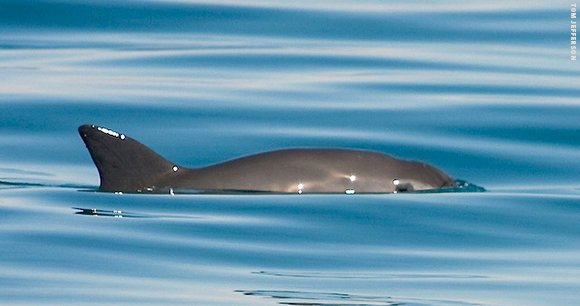
With 10 vaquita remaining, Mexico pushed to halt illegal fishing
Washington, DC—In a series of letters delivered today, conservation groups urged the United States and international authorities to use sanctions to pressure Mexico to save the vaquita, whose population has dwindled to just 10 remaining animals. Despite repeated promises for decades, the Mexican government has failed to stop the use of deadly gillnets that are entangling, drowning, and killing these porpoises—driving them to extinction.
“Only the strongest international pressure will force Mexico to get lethal fishing nets out of the water before these little porpoises disappear forever,” said Sarah Uhlemann, international program director at the Center for Biological Diversity. “For years, scientists, conservationists, and local fishermen have asked the Mexican government to stop illegal fishing and finally save the vaquita. When the US government finally embargoed seafood from the vaquita’s habitat, Mexico responded but still hasn’t stepped up enforcement. Time for real action is running out.”
In a letter sent today to the Convention on International Trade in Endangered Species of Wild Fauna and Flora, the groups urged authorities to suspend trade of hundreds of Mexican wildlife and plant species and products each year, including reptiles, orchids, spiders, sea cucumbers, and certain shark species, worth hundreds of millions of dollars. Mexico continues to violate CITES by allowing the trafficking of totoaba, a large, endangered fish. Illegal nets used to catch totoaba can drown the vaquita.
“The Mexican government has had ample notice and time to heed CITES’s warnings and recommendations but has failed to remedy its CITES violations regarding the totoaba and vaquita. Time is running out for the vaquita and there is no reason for CITES not to act now with the strongest measures possible,” said Clare Perry, ocean campaign leader of the Environmental Investigation Agency.
The groups also asked the US government to continue its ban on Mexican seafood, including highly lucrative trawl-caught shrimp, imported from the vaquita’s habitat in the Upper Gulf of California. The third letter requests that the UNESCO World Heritage Committee maintain the vaquita’s habitat—part of a designated World Heritage site—as “in danger,” along with requiring the Mexican government to submit a detailed management plan.
“Mexico has repeatedly broken its promises to protect the vaquita from harm,” said DJ Schubert, wildlife biologist at the Animal Welfare Institute. “The situation under the current administration has reached a crisis level. Without decisive action and stringent enforcement of Mexico’s fishery regulations, the vaquita will go extinct on President López Obrador’s watch.”
Beginning in 2018, the United States banned seafood imports from the vaquita’s habitat in the Upper Gulf of California to pressure the Mexican government to improve its conservation efforts. In an attempt to reverse the US embargo, Mexico issued new fishing regulations in September but failed to enforce the new rules. Conservationists have consistently documented hundreds of small boats, or pangas, illegally fishing or crossing the vaquita refuge.
“The extinction of the vaquita is squarely in the hands of Mexico’s government at this point,” said Zak Smith, a senior attorney at NRDC (Natural Resources Defense Council). “They have failed to protect this porpoise, as they said they would, and now is the time for all of us to hold them accountable. Waiting another year is not an option.”
- Marjorie Fishman, Animal Welfare Institute, (202) 446-2128, [email protected]
- Sarah Uhlemann, Center for Biological Diversity, (206) 327-2344, [email protected]
- Kari Birdseye, NRDC (Natural Resources Defense Council), (415) 875-8243, [email protected]
- Clare Perry, Environmental Investigation Agency, +34664348821, [email protected]
The Animal Welfare Institute (www.awionline.org) is a nonprofit charitable organization founded in 1951 and dedicated to reducing animal suffering caused by people. AWI engages policymakers, scientists, industry, and the public to achieve better treatment of animals everywhere – in the laboratory, on the farm, in commerce, at home, and in the wild. Follow us on Facebook, Twitter and Instagram for updates and other important animal protection news.
The Center for Biological Diversity is a national, nonprofit conservation organization with more than 1.7 million members and online activists dedicated to the protection of endangered species and wild places.
The Environmental Investigation Agency (www.eia-international.org) is a nonprofit conservation organization based in the UK which investigates and campaigns against environmental crime and abuse.
The Natural Resources Defense Council (NRDC) is an international nonprofit environmental organization with more than 3 million members and online activists. Since 1970, our lawyers, scientists, and other environmental specialists have worked to protect the world's natural resources, public health, and the environment. NRDC has offices in New York City, Washington, D.C., Los Angeles, San Francisco, Chicago, Bozeman, MT, and Beijing. Visit us at www.nrdc.org and follow us on Twitter @NRDC.